 Petzlover
Petzlover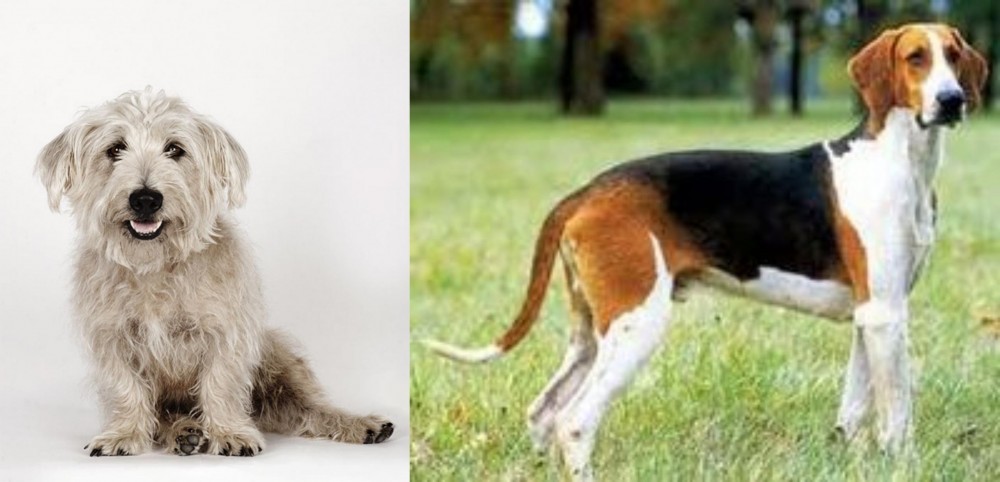 Glen of Imaal Terrier is originated from Ireland but Grand Anglo-Francais Tricolore is originated from France. Glen of Imaal Terrier may grow 34 cm / 13 inches shorter than Grand Anglo-Francais Tricolore. Glen of Imaal Terrier may weigh 19 kg / 41 pounds lesser than Grand Anglo-Francais Tricolore. Both Glen of Imaal Terrier and Grand Anglo-Francais Tricolore has almost same life span. Glen of Imaal Terrier may have less litter size than Grand Anglo-Francais Tricolore. Both Glen of Imaal Terrier and Grand Anglo-Francais Tricolore requires Low Maintenance.
Glen of Imaal Terrier is originated from Ireland but Grand Anglo-Francais Tricolore is originated from France. Glen of Imaal Terrier may grow 34 cm / 13 inches shorter than Grand Anglo-Francais Tricolore. Glen of Imaal Terrier may weigh 19 kg / 41 pounds lesser than Grand Anglo-Francais Tricolore. Both Glen of Imaal Terrier and Grand Anglo-Francais Tricolore has almost same life span. Glen of Imaal Terrier may have less litter size than Grand Anglo-Francais Tricolore. Both Glen of Imaal Terrier and Grand Anglo-Francais Tricolore requires Low Maintenance.
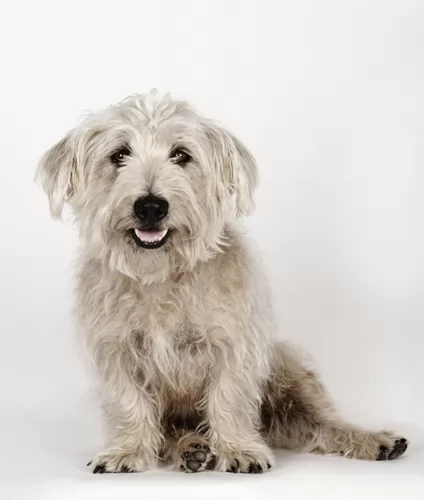 Hailing from Ireland and known also as the Wicklow Terrier or just Glen, the Glen of Imaal Terrier was used to get rid of rats, badgers and otters as well as being a good all-round farm dog.
Hailing from Ireland and known also as the Wicklow Terrier or just Glen, the Glen of Imaal Terrier was used to get rid of rats, badgers and otters as well as being a good all-round farm dog.
Using his strength, he was good at digging into burrows to root out badgers, but unlike other terriers, he wouldn’t go on and on yapping around his prey. He isn’t an excessive barker.
The terrier was recognised by the Irish Kennel Club in 1934 and later by the American Kennel Club in 2004. The Canadian Kennel Club recognized Glens in 2017.
 Originating in France, the Grand Anglo-Francais Tricolore has been recognized by the United Kennel Club in 2006. He was developed in France in the 1800s.
Originating in France, the Grand Anglo-Francais Tricolore has been recognized by the United Kennel Club in 2006. He was developed in France in the 1800s.
He is a rare breed, even in France. Today he is essentially a hunting- and scentdog and isn't really kept as a companion pet. The breed is recognized in France too by the French Kennel Club and also recognized internationally in 1983. In France today the dog is bred and kept primarily as a hunting dog and pet combined.
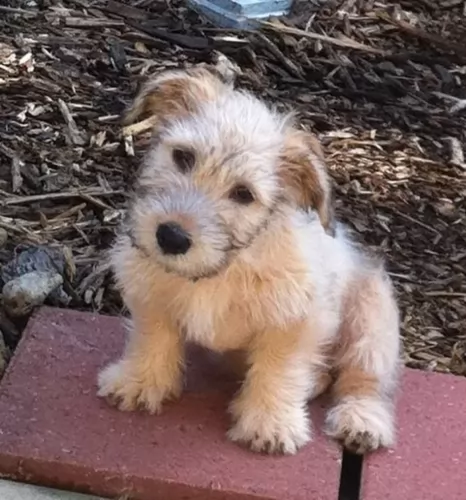 An interesting fact with the Glen of Imaal Terrier is that this is a dwarf breed, being a big sized dog on short legs, with the front feet turning out.
An interesting fact with the Glen of Imaal Terrier is that this is a dwarf breed, being a big sized dog on short legs, with the front feet turning out.
A typical Glen of Imaal Terrier stands at roughly 30 – 36cm and weighs up to about 16kg. Another interesting aspect with this dog is that it can take up to 4 years to reach maturity.
The head of this muscular dog is large, the ears are half erect, and while the tail has always been traditionally docked, it is often left long. The double coat of the dog is soft with the undercoat but he has a wiry outercoat. The color of the coat is essentially wheaten, tan or blue. The coat doesn’t shed much but some Glen owners strip excess hair a few times during the years.
Glen of Imaal terriers are energetic, easygoing and they make splendid pets for any family. He is more than happy to give up lying around for games and activity just to lie at his owner’s feet. He is an intelligent dog too and even though he is somewhat stubborn, he responds well to training and socialization. In fact training and socialization is important for every dog breed to prevent negative behavior and to ensure your pet is obedient.
 Looking quite a bit like its Foxhound ancestors,the muscular Grand Anglo-Francais Tricolore is a large dog standing at 60cm to 70cm tall at the withers and weighing in the region of 30kg and 35kg.
Looking quite a bit like its Foxhound ancestors,the muscular Grand Anglo-Francais Tricolore is a large dog standing at 60cm to 70cm tall at the withers and weighing in the region of 30kg and 35kg.
The Tricolore has a fairly broad, flat head, black nose and large brown eyes. His ears are set at eye level, they are medium length and floppy. The legs of the dog are straight and strong and the chest is deep and broad. The tail is long and slim. His double coat coat is short and smooth and he is tri-colored – tan, white and black.
Your Grand Anglo-Francais Tricolore has always been used as a hunting dog and scenthound and has been used in a hunting team. The dog has been created by crossing French scenthounds with English Foxhounds, with this particular dog being descended from crosses between the Foxhound and the tricoloured Poitevins.
There are actually 3 Grand Anglo-Français breeds, with this Grand Anglo-Français Tricolore being one. He is a docile dog and doesn't make a particularly good watchdog. The dog enjoys the company of other canines and while he can get on well with his human family, and is good and patient with children, he isn't the ideal pet with children, as his mind is on hunting and the chase and following exciting scents.
He is a dog totally dedicated to hunting and hunting in packs sees him getting on well in the presence of other dogs. His strong hunting instinct and his wish to roam on a scent makes it that he will require a very large garden.
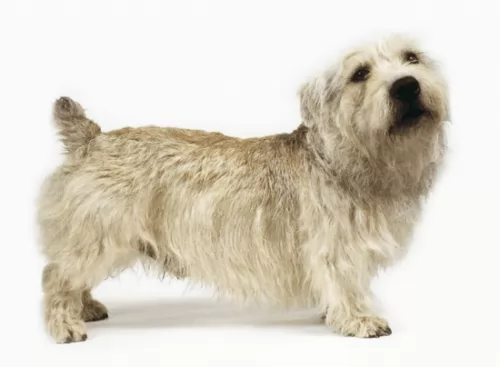 The Glen of Ismaal Terrier is more docile than other terrier breeds, but that doesn’t mean he isn’t feisty. He loves to play and is an adventurous dog, always on the lookout for exciting opportunities and to chase prey.
The Glen of Ismaal Terrier is more docile than other terrier breeds, but that doesn’t mean he isn’t feisty. He loves to play and is an adventurous dog, always on the lookout for exciting opportunities and to chase prey.
He is a good natured pet and he gets on well with adults, children and pets in the home. He can adapt well to life in the city or in the countryside so long as he is with his family members.
He isn’t a couch potato dog though, and wherever he lives, he will need a good amount of exercising. Treat him with the love and respect he craves, and you’ll have a wonderful canine companion.
 The Tricolore is an excellent hunter but he also makes a good family pet. Because of the dog having ingrained hunting skills you won't find him being used essentially as a pet.
The Tricolore is an excellent hunter but he also makes a good family pet. Because of the dog having ingrained hunting skills you won't find him being used essentially as a pet.
He can be stubborn, but with training and socialization he can become obedient and amicable. He is a dog that will require a great deal of exercise as he is an exuberant dog and won't do well in an environment where there is scant regard to outdoor living and exercise.
While hunting is a great love of this tri-colored dog, he is also capable of being a loving and devoted pet.
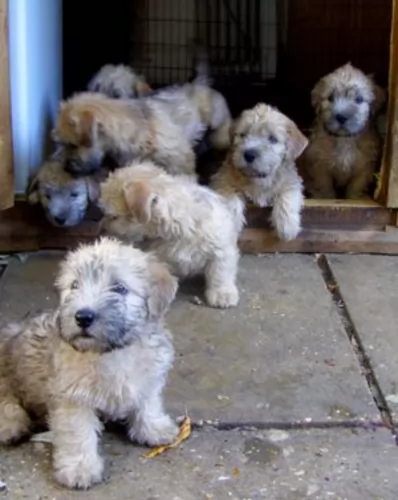 The Glen of Imaal Terrier is a feisty, healthy breed, particularly when he gets the best food there is, then he is not likely to get ill easily.
The Glen of Imaal Terrier is a feisty, healthy breed, particularly when he gets the best food there is, then he is not likely to get ill easily.
However, just like other dogs, he can be prone to certain health conditions such as hip dysplasia. When a dog is diagnosed with hip dysplasia, the socket part of the joint is poorly developed, so that is causes abnormal friction.
Inflammation and pain can be the result and your dog can become lame. Unfortunately, rapid weight gain with puppies can put more stress on the hips, and diets without the right balance of vitamins and minerals can be bad for good bone development.
 Living to be about 10-13 years of age, your Grand Anglo-Français Tricolore is fortunate to be a healthy dog, but just like many other dogs, he may well get sick and then, as a responsible dog owner, you need to get your 4-legged family member to the vet.
Living to be about 10-13 years of age, your Grand Anglo-Français Tricolore is fortunate to be a healthy dog, but just like many other dogs, he may well get sick and then, as a responsible dog owner, you need to get your 4-legged family member to the vet.
An abnormal hip joint can be hard for your dog as you notice him becoming less active and battling to get up after lying down. Hip dysplasia can lead to osteoarthritis, a limp and lameness. Get him to the vet so that you can at least help with making your pet's problem easier to bear.
Typically with deep chested dogs, the Grand Anglo-Français Tricolore can develop the life-threatening problem of bloat, when the stomach twists.
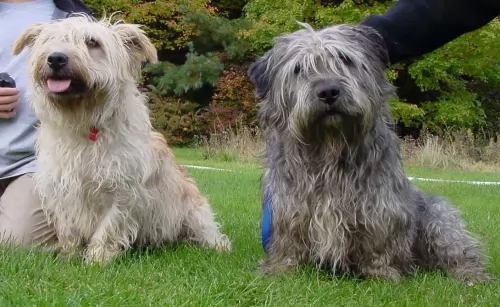 Caring for a Glen of Imaal isn’t going to be a huge job. This is what makes him such a wonderful pet as he is a straightforward pet, requiring little more than a brush to avoid the hair matting.
Caring for a Glen of Imaal isn’t going to be a huge job. This is what makes him such a wonderful pet as he is a straightforward pet, requiring little more than a brush to avoid the hair matting.
Check his ears, teeth and nails from time to time to ensure he is always in tip top condition.
If you intend making use of the convenience of commercially manufactured dog foods, the top quality one will provide you with balanced nutrition for your Glen and you can mix in some cooked brown rice, vegetables and chicken from time to time.
The Glen of Imaal Terrier is a small-breed dog and, he should be offered dog food that has been specially formulated for small, energetic dog breeds. You can also add in a little bit of raw meat into his kibble as a treat as this is important for keeping him free of skin allergies.
Make sure he always has a bowl of fresh, cool drinking water.
 The exercise requirements of this breed are high and he thrives on being busy and being involved in a hunt. If you do happen to keep him as a pet, he will require plenty of intense exercise from going on walks to joining in with your jogging and cycling activities. He just never seems to get enough exercise.
The exercise requirements of this breed are high and he thrives on being busy and being involved in a hunt. If you do happen to keep him as a pet, he will require plenty of intense exercise from going on walks to joining in with your jogging and cycling activities. He just never seems to get enough exercise.
The Grand Anglo-Français Tricolore requires little grooming and will do well with a good brushing twice a week to remove loose hairs.
For your Grand Anglo-Français Tricolore to be strong and healthy, he'll need protein for strong bones and muscles.Protein needs to be the primary ingredient in an active dog's diet. If you're not sure, ask your vet about the best kibble to feed him and add in some raw meat to this every now and then.
Where possible, cooked brown rice, vegetables and chicken can be added into the kibble too to make his diet more interesting and healthy. Fresh, cool water should be reachable for your dog 24/7.